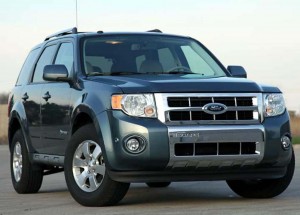
The redesigned Ford Escape will no longer offer a hybrid package - but will have two available EcoBoost options.
Ford will drop the Escape Hybrid when it launches an all-new version of its popular utility vehicle next year, turning to a high-mileage alternative using a new 1.6-liter version of its EcoBoost engine family.
The Escape Hybrid, though heralded as the first use of gas-electric technology in an SUV, has been selling at a sluggish rate in recent years. So, Derrick Kuzak, Ford’s group vice president of Global Product Development, says the hybrid powertrain will be shifted to a newer people-mover in the Ford line-up, the upcoming C-Max Hybrid, that should be 25% more fuel-efficient than the outgoing Escape Hybrid.
The next-generation Escape, which will migrate to a more crossover-like design and platform, will be officially unveiled at the LA Auto Show next month. It will come with a 4-cyliner EcoBoost engine rather than a V6 engine, Ford confirmed during a background session.
“Customers are prioritizing fuel economy above every other trait when they make most vehicle purchases,” said Kuzak. “Ford is meeting people’s needs by offering a family of fuel-efficient vehicles – from hybrids to electrics to traditional gasoline-powered cars – packed with class-leading technology, giving customers both exciting and greener driving choices.”
Kuzak said the 1.6-liter EcoBoost engine, which uses turbocharging, twin independent variable camshaft timing and direct injection to deliver the performance of a larger engine and the fuel -economy of a smaller one.
In its North American debut in the new Escape, it is expected to deliver even higher highway fuel economy than the current Escape Hybrid, which is EPA-rated at 31 mpg. The new 1.6-liter engine also is expected to deliver better fuel economy than larger four-cylinder engines such as those offered in the Toyota RAV4 and Honda CR-V, he said.
The Escape will be Ford’s first SUV to be available with two fuel-efficient EcoBoost engines, which will be offered as standard at more popular trim levels, Ford officials added. The 2.5 liter Ti VCT has been earmarked as the base engine in the new Escape, which will no longer be equipped with a V6.
Escape’s new 2.0-liter EcoBoost will have better fuel economy than competitors’ V6 engines while delivering unsurpassed performance compared to those larger six-cylinder engines, Ford representatives added.
“Expanding the availability of EcoBoost technology in the all-new Ford Escape will give customers a great range of choices for the fuel efficiency and performance they want in a small SUV,” said Joe Bakaj, vice president, Powertrain Engineering. “This advanced technology in the new Escape delivers on our commitment to provide class-leading fuel efficiency in every new Ford product.”
Since launch, sales of the 1.6-liter EcoBoost in Europe in Focus and C-MAX are exceeding expectations by 40%. Ford holds more than 125 patents on EcoBoost technology, a global approach to provide affordable fuel efficiency for millions of drivers that will extend to 90% of Ford vehicles by 2013. EcoBoost increases fuel economy up to 20% while reducing CO2 emissions by up to 15% according to Ford data.
With the addition of EcoBoost engines to the Escape, Ford will offer more advanced technology engines in its utility vehicle lineup than any other full-line manufacturer, the maker claimed during the background session.
While the Escape Hybrid may be going away, Kuzak insisted Ford will expand its electrified vehicle production capacity when it launches the C-MAX Hybrid and C-MAX Energi plug-in vehicles. Both five-passenger hybrids will provide another fuel-efficient option for customers.
Notably, the five-passenger C-MAX Hybrid will feature the first hybrid transmission and lithium-ion battery system Ford is building in-house. Until now, it had purchased the hybrid gearbox from an outside supplier.
“The C-MAX family of electrified vehicles will provide versatile, practical options for customers who need utility while reducing carbon output and significantly lowering fuel costs,” Kuzak said. “No other company is providing this type of choice in a hybrid or plug-in hybrid.”
